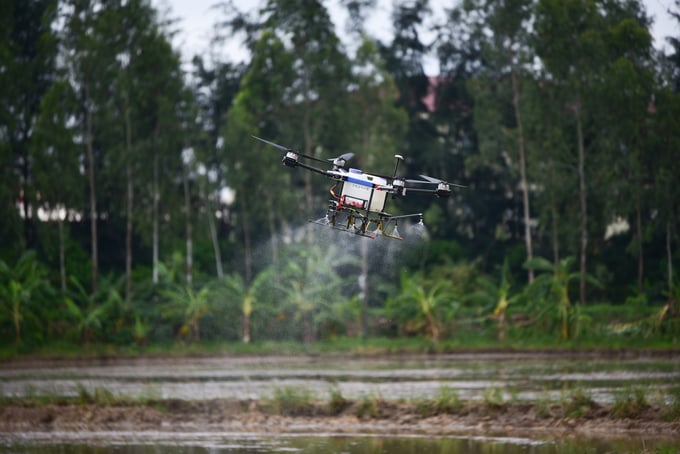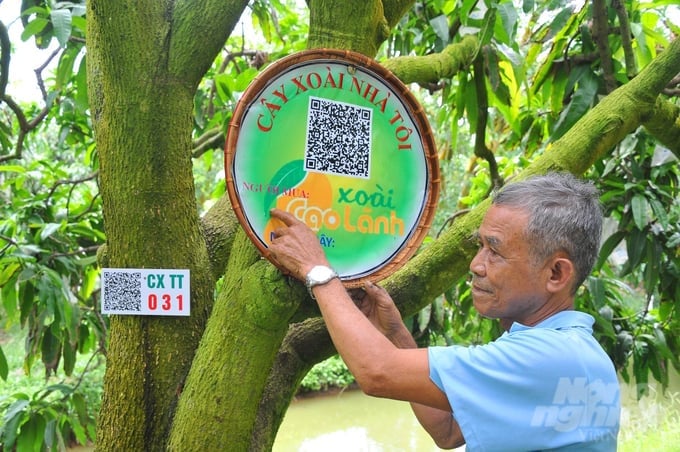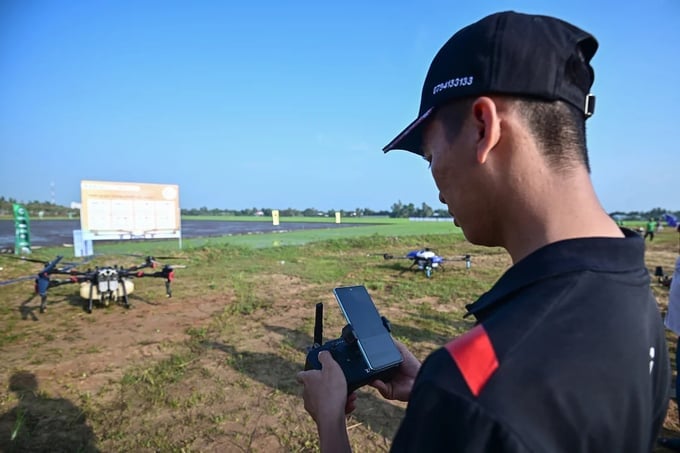May 30, 2025 | 00:56 GMT +7
May 30, 2025 | 00:56 GMT +7
Hotline: 0913.378.918
May 30, 2025 | 00:56 GMT +7
Hotline: 0913.378.918

Digital transformation and the application of scientific advancements in production are global trends in the agricultural sector. Photo: Tung Dinh.
The Ministry of Agriculture and Rural Development (MARD) emphasized the indispensable role of farmers in digital transformation efforts within the agricultural and rural development sectors.
Food security and sustainable development are the current priorities for the global agricultural sector. This acknowledgement has been highlighted across multiple reports at the World Government Summit on Agriculture 4.0 – The Future Of Farming Technology
In response to these challenges, agricultural sectors require comprehensive collaboration efforts among governments, investors, and innovative agricultural technology. Notably, an innovative agricultural production system based on the achievements of the Fourth Industrial Revolution will contribute to shaping value chains and expanding agricultural product supply with various advantages in optimizing resources/costs and expanding production.
The issue of integrating and applying digital platforms to agriculture is being addressed across various technological aspects such as big data, Internet of Things (IoT), robotics, sensors, system integration, Artificial Intelligence (AI), blockchain, cybersecurity, among many others. These aspects are posing a significant impact on agricultural production.
However, according to the McKinsey Global Institute's Industry Digitalization Index, the application of digital technologies in agriculture is currently the slowest among all sectors.

Farmers nationwide are effectively applying digital technology to agricultural production. Photo: Le Hoang Vu.
Consequently, agricultural sectors around the world must accelerate their digital transformation process in order to maintain pace with other industries and sectors, thereby effectively applying and integrating digital technologies into agricultural value chains; increasing productivity; reducing production costs; and maintaining eco-friendly natural environments.
The digital transformation process is occurring worldwide at a rapid pace, opening doors for countries to enhance labor productivity, drive innovative creativity, and enhance national competitive capabilities. Several countries have implemented specific strategies and action plans with strong commitment.
Namely, to establish a foundation for agricultural digital transformation, after the Food and Agriculture Organization (FAO) issued guidelines for developing digital agriculture strategies, it supported 18 countries in the European and Central Asian regions in constructing national digital agriculture strategies. Additionally, several developed countries have formulated their own agricultural strategies, including Denmark, China, Russia, Japan, South Korea, and Thailand.
Vietnam is beginning its journey towards digital transformation to usher the economy into the digital age. As a result, learning from, and creatively applying the experiences of other countries worldwide is essential to shorten the time and enhance the effectiveness of digital transformation, especially in agriculture and rural development.
The development of agriculture and rural areas plays a critical role in the success of economic and social development processes, as well as the industrialization and modernization efforts of many countries. This sentiment is especially true for Vietnam, a country with agriculture as its foundation.
Vietnam's agricultural sector has made remarkable progress over the years. The country has emerged as a leading exporter of agricultural products and foodstuffs, placing it among the top five exporters worldwide.
Accordingly, Vietnam has placed a significant emphasis on market-oriented development coupled with value chain-based production and processing of agricultural commodities. Furthermore, the country is actively pursuing digital transformation and e-commerce initiatives. Another Vietnam's developmnent priority includes enhancing transactions through e-commerce platforms to support local governments in connecting and consuming agricultural products.
However, Vietnam's agricultural growth within the last few years has remained primarily extensive, focusing on increasing land area, cropping intensity, and relying on traditional input factors for production (labor, capital, materials, etc.) and abundant natural resources. Over time, this approach has revealed numerous persistent challenges and limitations.
Accordingly, the current agricultural growth model has generated high volume of yields at a low value, marked by suboptimal efficiency in land and resource utilization.
Without significant changes in science and technology, particularly in the field of modern digital technologies, Vietnam's agricultural and rural development sectors will face new challenges and negative impacts such as technological lag, depletion of natural resources, and a decline in production and business competitiveness. Moreover, resulting Vietnamese products will be unable to compete with other countries in the region and the world.
The rapid wave of technological innovation alongside global integration and trade liberalization will exert significant competitive pressure on businesses, particularly those operating in the agricultural sector.

Vietnamese farmers are gradually shifting their focus towards applying scientific and technological advancements in agricultural production. Photo: Tung Dinh.
With an agricultural development strategy that embraces the application of 4.0 technologies against the backdrop of extensive globalization, the vibrant advancement of new digital technologies will serve as comprehensive solutions to address the limitations faced by Vietnam's agricultural sector.
Agricultural digital transformation must be established on a data-driven foundation, which will require Vietnam's agricultural sector to digitize sectoral data by developing digital platforms, applications, and big data systems for information pertaining to land, crop, livestock, forestry, aquaculture, water resource, disaster prevention, disease control, and market.
The application of digital technology in developing digital economy and digital society activities within the agricultural sector will focus on digital agriculture, digital rural areas, and digital farmers. Consequently, these activities will accelerate the restructuring of the agricultural sector in association with growth model innovation.
On the other hand, Vietnam must promote the transition from an agricultural production-centric mindset to an agricultural economic-centric thinking; the construction of new rural areas with a focus on ecological agriculture, circular agriculture, modern rural areas, and professional farmers.
This approach will significantly contribute to ensuring food security; developing sustainable green agriculture; improving productivity and production efficiency; optimizing production processes and origin tracing; and reducing emissions.
The agricultural sector has acknowledged that agricultural digital transformation are necessary developments. The process involves transitioning from complete reliance on natural conditions and market demand, to agricultural production based on data and forecasts regarding natural conditions, demand, trends, and market preferences.
Consequently, the Ministry of Agriculture and Rural Development will closely coordinate with other ministries and sectors to accelerate agricultural digital transformation, thereby generating value-added for agricultural supply chains.
Farmers nationwide are effectively applying digital technology to agricultural production. With the support of local governments and the determination of "4.0 farmers," digital transformation have made initial progress in the agricultural sector, which includes promising results in the fields of crop production, livestock production, aquaculture, and forestry.
Various precision agriculture softwares and programs are being utilized to optimize resource usage (such as water and fertilizers), thereby fostering a transition from traditional agriculture to modern agriculture. This transition will create numerous opportunities to increase labor productivity, reduce dependence on environmental and weather conditions, and improve control over disease outbreaks.
Translated by Nguyen Hai Long
/2025/05/25/4127-3-073637_820.jpg)
(VAN) Thanks to the promotion from an FAO-implemented project, vegetable production in greenhouses in Moc Chau has seen strong development, from 1.5 hectares in 2021 to nearly 50 hectares in 2024.

(VAN) FAO has recently supported USD 140,000 to implement the project 'Risk mitigation human-animal interface risks through disease control initiatives in pig farming.'

(VAN) The People's Committee of Tra Vinh province has approved an adjustment to the investment policy for the Green Hydrogen Plant project, increasing its area to approximately 52.76 hectares.
![Reducing emissions from rice fields: [2] Farmers’ commitment to the soil](https://t.ex-cdn.com/nongnghiepmoitruong.vn/608w/files/news/2025/05/05/dsc08881jpg-nongnghiep-140632.jpg)
(VAN) Clean rice cultivation model in Thuong Tan commune, Bac Tan Uyen district, is assisting local residents in achieving sustainable agriculture by substantially reducing costs, increasing productivity, and protecting the environment.

(VAN) At the conference to disseminate Resolution No. 68, AgriS introduced its digital agricultural ecosystem and reaffirmed its commitment to accompanying the Government in promoting private sector development and sustainable agriculture.

(VAN) 'Blue Ocean - Blue Foods' initiative is designed to restore marine ecosystems and establish sustainable livelihoods for local communities by cultivating a minimum of 1,000 hectares of cottonii seaweed in the first three years.
/2025/05/21/4642-3-112707_603.jpg)
(VAN) The V-SCOPE project has made direct contributions to three out of six pillars of the Comprehensive Strategic Partnership between Vietnam and Australia.